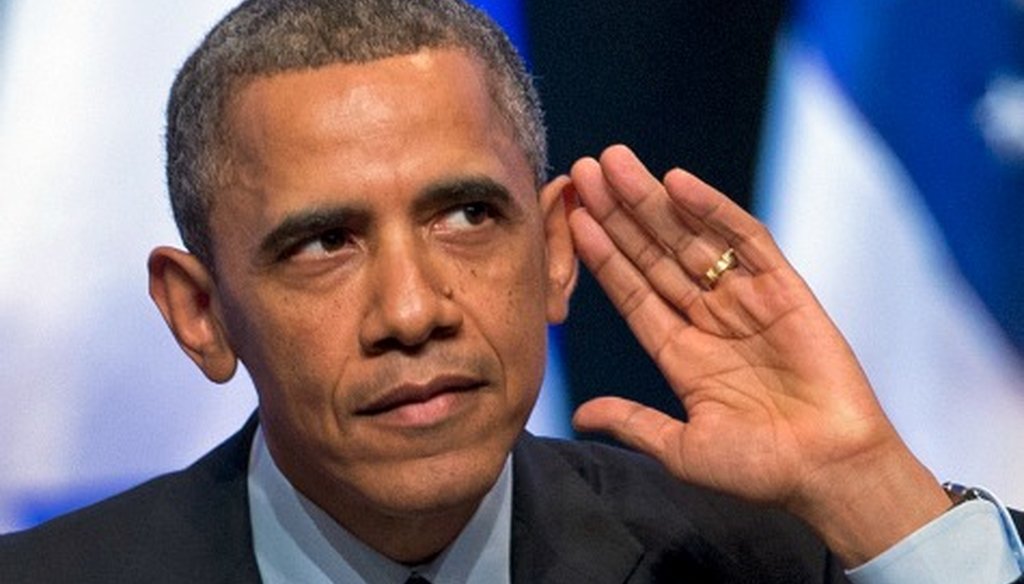Stand up for the facts!
Our only agenda is to publish the truth so you can be an informed participant in democracy.
We need your help.
I would like to contribute

Did we hear that right? An Obama adviser said Sunday that the president's job approval poll numbers are actually on the upswing. We decided to check it out.
Have President Barack Obama’s poll numbers turned a corner?
Meet the Press moderator David Gregory said Sunday that Obama’s approval number remained at 41 percent, according to a new Wall Street Journal/NBC poll. That’s low, but not historically dismal.
Obama senior adviser Dan Pfeiffer offered a brighter outlook in response. (It’s no shock that he’d try.)
"Public polls, they’re all over the map," Pfeiffer told Gregory. But, Pfeiffer said, "We’re working our way back. If you look at the aggregate of public polling, we've gained 3 points in the last couple months."
A White House spokesman pointed us to Real Clear Politics, a political website that aggregates polling data and calculates an average.
Sign up for PolitiFact texts
While the Wall Street Journal/NBC poll released last week has Obama hitting a new low with an approval rating of 41 percent, the Real Clear Politics average had Obama bottom out in December with an aggregate approval rating of 39.8 percent.
On March 17, Obama’s aggregate poll numbers put his approval rating at 42.9 percent. That accounts for the 3-point jump that Pfeiffer claimed.
The recent "surge" seems to be skewed largely by outlier polls conducted by Rasmussen Reports and Bloomberg.
In a survey from March 13-15, Rasmussen Reports said 49 percent of Americans approve of Obama, while 50 percent disapprove, a statistical dead heat. Bloomberg between March 7-10 found an even split among those surveyed -- 48 percent both approved and disapproved of Obama. That’s a six-point improvement from December.
Other poll aggregation methods, meanwhile, show much more modest gains by the president.
Huffington Post, for example, tracks 88 polls and takes a snapshot of the daily tracking polls from Gallup and Rasmussen every three days. According to their model, Obama’s aggregate approval rating was 42.5 percent on Dec. 2 (his low point) and has jumped just a bit to 43.3 percent. That’s less than 1 percentage point, a considerably smaller improvement than Real Clear Politics’ average.
Charles Franklin, co-founder of pollster.com and director of the Marquette Law School Poll in Milwaukee, walked us through his own aggregation of Obama’s poll numbers.
According to Franklin, Obama’s low point came Dec. 2 when he registered an approval rating of 41.98 percent. He currently estimates the number at 44.38, a gain of about 2.4 percentage points.
So all three poll averages show Obama’s low point actually came in early December, but his bounceback varies depending on the methodology.
"There are various ways of ‘averaging’ or aggregating polls to estimate trends," Franklin said. "My bottom line: There has been some gain though it appears to be not as large as 3 points when using all available polls and a standard trend estimate. There may be a specific pollster you could find that has shown a 3 point gain, but that is cherry-picking the one with a larger gain, rather than using all the polls as I and HuffPost do."
On Pfeiffer’s claim, we said: Mostly True.
On ABC’s This Week, a liberal pundit also turned to poll numbers to help make her point.
Katrina vanden Heuvel, editor of The Nation, argued that Democrats should take advantage of what she called a populist moment.
"The majority support (raising) the minimum wage," vanden Heuvel said on ABC’s This Week. "More fairness, taking on a rigged system that's working against working people."
Vanden Heuvel read the polls correctly, but it’s unclear if the issue ultimately will sway any elections. Still, her claim rates True.
The latest results from a Bloomberg poll show 69 percent of the public supports raising the minimum wage to $10.10 an hour over the next three years. A CBS/New York Times poll in February found 65 percent support for raising the minimum wage.
But polls also suggest that it’s not necessarily a high priority for many Americans.
A February Gallup poll found just 2 percent of respondents said wages were the most important issue facing the country. A Quinnipiac University poll in January had very similar results. In an open-ended question about the nation’s top priority for 2014, 1 percent of respondents mentioned the minimum wage, while 16 percent said jobs and unemployment, 15 percent said the economy in general, and 18 percent said health care.
Staff writers Steve Contorno and Jon Greenberg contributed to this report. Aaron Sharockman is the editor of PunditFact.com.
Correction: Charles Franklin said President Barack Obama's aggregate approval rating bottomed out at 41.98 percent in December 2013. An earlier version of this story included a different figure.
Our Sources
See individual fact-checks.
























